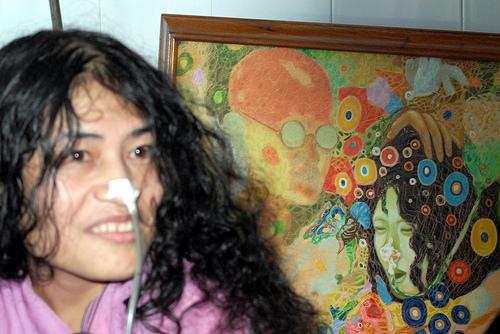Protest against use of Armed Forces (Special Powers) Act 1958, has shifted from extreme northeastern part of the country to the remote northern part. Now, demands are high by the Chief Minister of Jammu and Kashmir, Omar Abdullah, to withdraw at least partially, the aforesaid Act, from his state in order to bring peace in the troubled region of the country. It is alleged that in guise of the search for militants, the security personnel are misusing the Act and ‘harassing and torturing’ the innocent people of the state. The Union government is now facing an embarrassing situation due the state’s demand.
Similar demand for withdrawal of the AFSP Act1958 is long pending issue of the Manipur state in the Northeastern region. It has been brought into the notice of the Union and State governments by various intellectuals and organizations, but remained unresolved even after the lapse of eleven years.
It was on 2nd November 2000, at Melom, a small place in Manipur, where the Assam Rifles jawans killed ten innocent people, who were waiting for a bus. A number of cases of rapes, killings and arrests of innocent people, were also alleged against the security personnel under the cover of AFSPA during the search operations. In protest against the use of AFSPA, an Iron lady Irom Sharmila began indefinite hunger strike with effect from 4th November 2000, which has now entered into 12th year. According to her due to the continuance of aforesaid Act, the security men were free to misuse the same to harass and torture the innocent people of the state. The Armed men were also accused of killing innocent people, raping women and arresting a large number of people for no fault of theirs. A number of people are still not traceable, it is alleged.
Instead of looking into the demands of Irom Sharmila, the state administration resorted to the actions to end her hunger strike. She did not bow down under such pressures. Ultimately, the administration took her into custody, but the hunger strike continues. After the rape of a woman by security personnel, the fire of protests broke throughout the state. Twelve women paraded ‘naked’ on the roads in protest. Chittaranjan, a Manipuri youth set himself under fire. Thousands of men and women under a united forum of 32 organizations jumped into the agitation against the ‘Black Law’ defying curfew and demanding establishment of human rights.
Paying due support to the fast of Irom Sharmila, the people in general, intellectuals and various organizations of other northeastern states, including Assam, came out. Even Delhi was not spared. The students of Delhi University, teachers, democratic and human right organizations and intellectuals also came out in Sharmila’s support. The issue was also taken beyond the country to other human rights organizations, but all in vain. No result has come out.
Finally, the Union government constituted a five-member enquiry commission under the chairmanship of former Supreme Court Justice B P Jiwan Reddy. The Commission suggested reviewing the Act and withdrawing AFSPA, 1958 fully. The report was already submitted to the Government on 6th June 2005. The Union government by ignoring the Reddy Commission’s suggestions continued operation of the ‘black law’ throughout the Northeastern region including Assam and Manipur. This resulted in very serious impact in the minds of the people of this region. Now, similar issues are spreading in other parts of the country. In Manipur, thousands of people came out in protest under the banner of united forum of 32 organizations. They defied the curfew orders promulgated in the area. The voice of the people was raised before various human rights organizations of the world. It is surprising, the government did not take action to carry on the suggestions of its own constituted commission’ and have continued the operation as yet. No end to ‘black law’ is in sight as yet. Now, since the demand for withdrawal of the Act is spreading in other parts also, the people of this region may wait for some result in due course.
- Add new comment
- 14615 reads








Comments
Pages
Add new comment